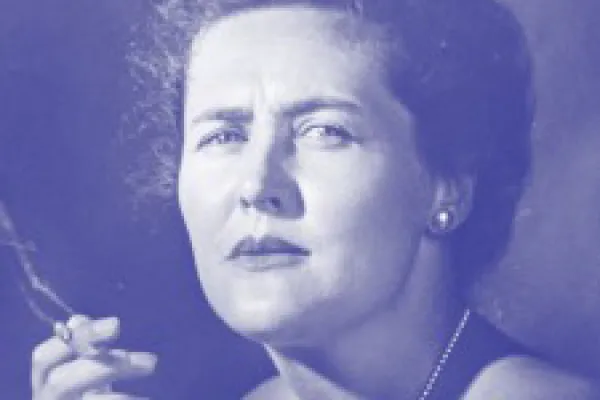‘Nobody’s Girl’: Campus Panel Explores a 1940s Labor Dispute that Still Resonates Today
Smith & Northampton

Published September 22, 2014
One day back in 2012, a house manager at the Academy of Music in Northampton discovered a dusty cardboard box stuffed full of old letters and other documents hidden beneath a desk.
The Academy’s executive director, Debra J’Anthony, took the box home. After many hours poring over its contents, J’Anthony came to a realization: “Oh my gosh, we have a play!” she said.
The documents told the story of a long-forgotten local labor dispute that erupted in the 1940s when longtime cashier Mildred E. Walker was appointed head of the Academy of Music after then manager Frank Shaughnessy was called up for military service in World War II.
The episode—which resulted in a headline-making court case after the company leasing the theater ousted Walker because they didn’t want a woman in charge—is now an original play with several links to Smith.
“Nobody’s Girl,” a screwball comedy by local playwright Harley Erdman will play Friday and Saturday, Oct. 17 and 18, at 8 p.m. at the Academy. Sam Rush, production and publicity manager for Smith’s theatre department, plays Shaughnessy. (His daughter, Molly Damon-Rush, 12, plays a Girl Scout in the show).
In a special pre-production event, Smith’s women and gender studies department is hosting a panel discussion on “1940s Women in Labor: Then and Now” at 11 a.m. Saturday, Sept. 27, in the Neilson Library Browsing Room.
Scholars, including Smith emeritus professor Daniel Horowitz, have been invited to shed light on the larger issues raised by the play—including the persistence of what J’Anthony called a “glass ceiling for women” in theater and other fields.
“The panel is an opportunity for us to create dialogue around these issues,” J’Anthony said. “It will be interesting for us to examine how far we’ve come since women went in full force to replace men at war—and how far we still have to go.”
Horowitz, who taught history and American studies at Smith from 1989 until his retirement in 2012, will draw connections between Walker and feminist author and icon Betty Friedan ’42.
Friedan (then Goldstein) “became radicalized at Smith over women’s issues, anti-fascism and labor issues,” Horowitz said. She wrote about organizing attempts by college maids and buildings and grounds workers, arguing that their fight was central to the “expansion of democracy in America,” he added.
Horowitz noted that both Walker and Friedan experienced a time when war and labor organizing were reshaping the lives of American women. “I hope people come away from the discussion understanding how dramatically the position of women was changing,” he said.
Jacqueline Castledine, a lecturer at the University of Massachusetts Amherst and co-director of the Valley Women’s History Collaborative, will moderate the panel. In addition to Horowitz, other speakers are Dale Melcher of the Labor Extension Program at UMass and Ivette Hernandez, a board member of the Boston-based Institute for Women’s Leadership Development.
The dramatic story told in “Nobody’s Girl” has other connections to Smith: College president William A. Neilson was on the board of the Academy at the time members appointed Walker theater manager.
The college also briefly had a woman at the helm in 1940—though not because of the war. When Neilson retired in 1939, Elizabeth Cutter Morrow, an alumnae trustee and member of the Class of 1897, served as acting college president for one year. (Smith appointed its first female president, Jill Ker Conway, in 1975.)
The heroine of “Nobody’s Girl” is a complex character, J’Anthony noted. Walker, a well known member of Northampton’s arts community in the 1940s, was “looked on askance by more conservative elements in town,” J’Anthony said—not only because of her insistence on earning a salary equal to Shaughnessy’s, but also because the two were reportedly having an affair. (Shaughnessy was married.)
Although Walker’s case became a local “cause célèbre,” Walker was not successful in court and was never allowed to work at the Academy again, J’Anthony said. Walker died in the 1970s.
Despite its serious subject, “Nobody’s Girl” is written as a comedy in the rapid-fire style that was popular in the 1940s, says playwright Erdman, who is graduate program director and professor of dramaturgy at UMass.
In addition to enjoying the “zaniness,” Erdman says he hopes audiences will learn something new about local history.
“The play is a chance to learn about a forgotten person who did something important,” Erdman said. “I think people will see in Mildred’s story the glass ceiling and the sex bias that still resonates today—but also the heroism of everyday people.”
Mildred Walker's ouster as manager of the Academy of Music in 1940 became a local cause célèbre—and is now the subject of an original play with Smith connections.